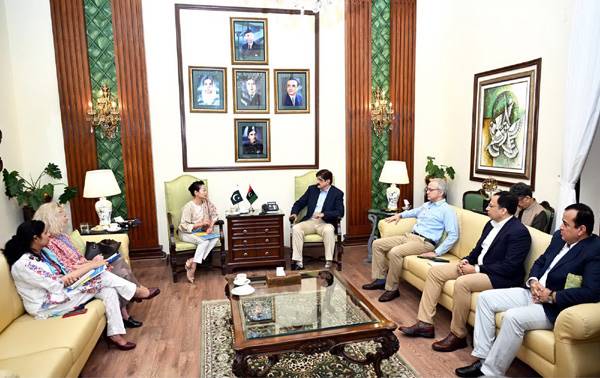
Sindh Chief Minister Syed Murad Ali Shah met with World Food Programme (WFP) Country Director Coco Ushiyama to explore new avenues of collaboration in the areas of nutrition, education, and climate resilience. The high-level meeting was also attended by WFP Provincial Head Hilde Bergsma, Policy Officer Salma Yaqoob, and senior government officials, including Principal Secretary Aga Wasif, Chairman P&D Najam Shah, Secretary School Education Zahid Abbasi, and Secretary Health Rehan Baloch.
The discussions focused on aligning and strengthening existing programmes, particularly those in health, nutrition, and education. A key focus was the planned school meals programme, with an emphasis on incorporating Water, Sanitation, and Hygiene (WASH) facilities to promote a healthier school environment. Enhancing community resilience and supporting livelihoods restoration were also highlighted as critical areas of cooperation.
Chief Minister Murad Ali Shah expressed his appreciation for WFP’s sustained support and emphasized the need for integrated efforts to improve nutrition and health, especially for women and children. He underscored the Sindh Government’s commitment to building climate-resilient food systems and ensuring food and nutrition security in times of crisis.
A central point of the discussion was the Benazir Nashonuma Programme (BNP), part of the broader Benazir Income Support Programme (BISP), the country’s largest social protection initiative. Targeting pregnant and breastfeeding women and children under two, the BNP addresses malnutrition during the crucial first 1,000 days of life. With WFP’s support, the programme operates through 569 facilitation centres nationwide and has reached over 3 million beneficiaries. In Sindh, it covers 30 districts, benefiting over 1 million women and children.
The meeting also reviewed progress under the Memorandum of Understanding signed between WFP and the Sindh government. This agreement aims to enhance Sindh’s capacity to address food insecurity and environmental challenges by 2027. It prioritizes improving access to nutrition, health, and education in vulnerable communities, while also promoting sustainable livelihoods and strengthening food systems to withstand climate shocks.
WFP Country Director Coco Ushiyama reaffirmed the organization’s commitment to supporting Sindh through strategic, government-aligned initiatives. She emphasized that future projects will be designed in close coordination with provincial authorities and tailored to available resources, with a shared goal of advancing sustainable development and ensuring food accessibility for all.
